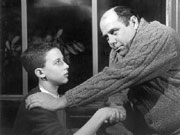“YOU PEOPLE HAVE created the American ideal and it fucking excludes you,” claims angry leftist screenwriter Garfield “Gar” Hampson Jr. to Jewish studio mogul Samuel Baum in Daniel Goldfarb’s cutting new play Adam Baum and the Jew Movie. It’s an accusation spilling over with unnerving subtleties, successfully implicating both Hampson, whose self-righteousness veils a fairly vicious naﶥt鬠and Baum, devastated by the degree of truth in the statement but loathe to produce a film about anti-Semitism that will appeal only to “guilty Reds with gold watches.” The play, set in post-World War II Hollywood but incisively modern in its understanding of American identity problems, seethes with other such gray areas that this production can’t quite articulate.
Adam Baum and the Jew Movie
Empty Space Theater ends February 10
Hampson (Terry Edward Moore) has been hired by Baum (Tom Spiller) to beat 20th Century Fox to the punch by bringing Hollywood’s first “Jew movie” to the screen and winning accolades for his studio’s profitable bravery. Unfortunately, a jaded Baum sees money in whitewashing the issue, while the gentile Hampson wants the piece dripping with impossibly dark honor. The production’s best moment comes when Spiller slowly reveals the mogul’s dizzy realization that Gentleman’s Agreement, the freshly scrubbed Fox effort featuring Gregory Peck, will wipe them both away.
ELSEWHERE, THOUGH, Spiller, in a role suggesting the famously outsized coarseness of producer Sam Goldwyn, isn’t as slick with his shtick as he needs to be. Director Adam Greenfield has him punching at the ethnic cadences and idiomatic follies (“You stop putting thoughts in my mouth!”) instead of swinging with them. You can see the shape of the role hanging promisingly just outside him, and with some time he may pull it snugly in to fit.
Moore fares better, proudly making liberal poses while his acidic prejudices seep through his armor, but Greenfield hasn’t made Goldfarb’s daring nuances clear enough.
This is especially true when young Jonathan Nielsen Kuhn fumbles his bits as the title character, fresh off his bar mitzvah and a dangerously innocent soul on the verge of solidifying for himself what it means to be both a Jew and an American male. Kuhn has listened to everything Greenfield has told him, but he doesn’t know how to respond to any of it. When Baum rages desperately at his son to pull down his pants to prove to Gar that he’s a Jew—a humiliation that would fluster even a grown man—Kuhn has no reaction until his line calls for it (by which time his subsequent “I hate you!” seems inadequate).
The combative script discussions between Gar and Baum are filled with similar explosions that don’t feel like the result of the rumblings that should lead to them. Too much of the production moves like charted maneuverings from chair to chair; we don’t get enough sense of the area in between. Greenfield knows what’s going on here but is better with the highs than the crucial lows. And it’s difficult to be moved by the peaks when you haven’t been given the thrill of the climb.








